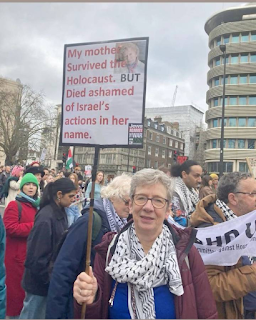Judaism - Israel - Palestine - Part VI
Part V - This is Part VI
The
war ended in 1949 with Israel’s victory, but 750,000 Palestinians were
displaced, and the territory was divided into 3 parts: the State of Israel, the
West Bank (of the Jordan River), and the Gaza Strip.
Growing up in the 1950’s
and early 1960’s, I have clear memories of:
Palestinian
fedayeen (from the Arabic fidā'ī, plural fidā'iyūn, فدائيون)
are militants or guerrillas of a nationalist orientation from among the Palestinian
people.[1][2] Most Palestinians consider the fedayeen to be "freedom
fighters",[3] while most Israelis consider them to be
"terrorists".
https://en.wikipedia.org/wiki/Palestinian_fedayeen
The “fedayeen” I heard
about were described as what I would characterize as: “crazed, violent,
murderous men” who crossed from The West Bank and sought to kill innocent
Israeli’s (Jews) out of pure hatred (alone).
The fedayeen I heard
about were never spoken of as men, or their sons, who had been forced out of
their villages. They and their families
have never been allowed to return anywhere in Israel. They have never received compensation for
their losses, which go well beyond simply their family house.
The 1949–1956 Palestinian expulsions were
a continuation of the 1948 expulsion and flight of Palestinian Arabs from Israeli-controlled
territory that occurred after the signing of the ceasefire agreements.[1][2][3][4] This
period of the exodus[5] was
characterised predominantly by forced expulsion during the consolidation of the
state of Israel and
ever increasing tension along the ceasefire lines ultimately leading to the
1956 Suez
Crisis.[6]
Between 1949 and 1950, according to historian Benny Morris,
Israel had displaced and expelled between 30,000 and 40,000 Palestinians and Bedouin.[7] Many
villages along the ceasefire lines and the Lebanon border area were also
leveled, many emptied villages were resettled by new Jewish immigrants and
demobilized Israeli military forces.[8][9]
Israel argued this was motivated by security
considerations linked with the situation at the borders. During the
consolidation period, Israel was more intent on gaining control of the
demilitarized zones on the Syrian, Jordanian and Egyptian fronts than on her
image abroad.[10][11][12][13]
https://en.wikipedia.org/wiki/1949%E2%80%931956_Palestinian_expulsions
The United Nations General Assembly adopts
resolution 194 (III), resolving that “refugees wishing to return to their homes
and live at peace with their neighbours should be permitted to do so at the
earliest practicable date, and that compensation should be paid for the
property of those choosing not to return and for loss of or damage to property
which, under principles of international law or equity, should be made good by
the Governments or authorities responsible.”
(December 11, 1948)
https://www.unrwa.org/content/resolution-194 -
From 1948 to 1966, martial
law was officially imposed on the Arab minority in Israel, but continues to be
intermittently enforced to this day. The military government, in effect,
imposed various restrictions on Palestinians. Palestinians were required to
apply for permits to travel from area to area, regardless of destination.
Security checkpoints were set up to enforce these permits. Those who disobeyed
these regulations
were jailed or fined. All
petitions or requests for government services were directed to military courts
instead of civil courts (Weil, 2007).
I am a little unclear about what the Palestinians –
within Israel – citizens of Israel were supposed to do during the time period
from 1948-1966?
They seemingly had “collective punishment” in a
variety of ways. To the present day
Israel has no constitution guaranteeing All its citizens basic rights. Palestinian Israeli citizens have no rights
to basic things like: housing renting or
purchasing, equal employment opportunity – equal pay for equal work and much
more. They are not allowed to be in the
Israeli military, which Jewish citizens (without religious exemption) are
required to do. Where Jewish citizens
are exempted from military service, they do not lose basic rights. Non-Jewish Israeli citizens lack some rights
because they have Not served in the military.
There are some exceptions regarding military service such as from Druze
citizens, but even they face discrimination in various areas.
Any Jewish resident of anywhere in the world is – by
being Jewish – allowed to emigrate and become a citizen.
It is unclear to me what Palestinian citizens of
Israel are supposed to do? They can’t
gain rights through anything that they may do.
At the same time, Palestinian Israeli citizens are
actively involved in working and living in Israel.
According to official figures from the
Health Ministry and the Central Bureau of Statistics provided at the request of
Haaretz, 17 percent of Israel's physicians, 24 percent of its nurses and 47 percent of its
pharmacists are Arabs.Mar 17, 2020
(1st
entry from Google search of February 6, 2024 – “percentage of Israeli
pharmacists who are Palestinian”
I
find information such as I have shared above – strongly supportive of – boycotts
– as in BDS, condemnation. I am reminded
of racism in the United States and how South Africa ended Apartheid decades
ago.
I
suggest reading up on the subjects addressed above and much more. Reading my reviews of two books is one
potential starting point.
Stories of Personal Transformation:
RECLAIMNG JUDAISM From ZIONISM, edited by Carolyn L Karcher has 40 stories of Jewish authors
https://www.georgemarx.org/2021/06/reclaiming-judaism-from-zionism.html
Except for Palestine: The Limits of Progressive Politics
– Marc Lamont Hill and Mitchell Plitnick – discusses how “progressives” often
are seemingly “open minded” and progressive in most, if not all areas, except
related to the Palestinian People.
https://www.georgemarx.org/2021/05/progressives-palestine-book-review.html
https://www.georgemarx.org/2024/02/judaism-israel-palestine-part-vii.html


Comments
Post a Comment